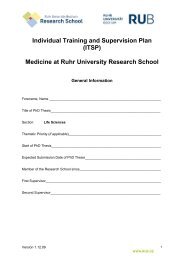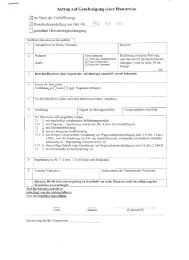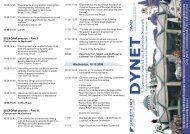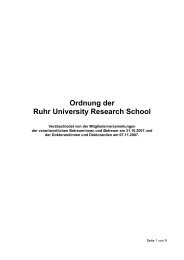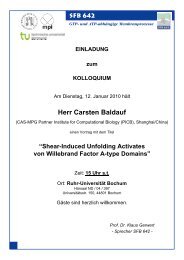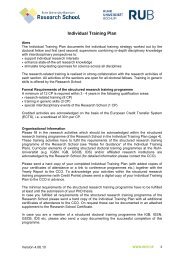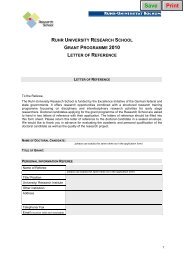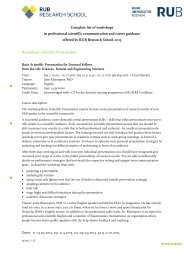Section Days abstract book 2010.indd - RUB Research School ...
Section Days abstract book 2010.indd - RUB Research School ...
Section Days abstract book 2010.indd - RUB Research School ...
You also want an ePaper? Increase the reach of your titles
YUMPU automatically turns print PDFs into web optimized ePapers that Google loves.
THE RELEVANCE OF METAPHOR TO EVERY FIELD<br />
OF SCIENTIFIC RESEARCH<br />
Corinna Koch<br />
Fakultät für Philologie; Ruhr-Universität Bochum, 44780 Bochum, Germany<br />
e-mail: corinna.koch@rub.de<br />
No matter from what field one approaches metaphor, there is an inevitable connection to other<br />
disciplines such as linguistics, psychology, cognitive and social sciences. These connections<br />
are highly necessary in order to take all the different implications of metaphor into account.<br />
The contribution of a wide range of disciplines is therefore not only an optional consideration<br />
but a must for any scientific work on metaphor. Various tensions arise from this approach,<br />
however, as “[w]hat is metaphorical to the linguist threatens to be not metaphorical to the<br />
psycholinguist” 1 . These tensions need to be resolved within the respective projects but only<br />
by working on and with them can one gain full insight into the phenomenon of metaphoric<br />
transfer.<br />
To the same extent that interdisciplinary work is necessary for scientific research on<br />
metaphor, metaphor is relevant to every scientific discipline as it is omnipresent in human<br />
thinking (constructing analogies and making connections between ideas) and language (to<br />
explain and denote <strong>abstract</strong> ideas or to find indirect but powerful ways of conveying<br />
opinions). By investigating the use of metaphors, one can reveal how people conceptualize the<br />
world and thereby discover their perspective on a particular topic or object. Disciplines should<br />
therefore reflect upon and critically question the metaphors that occur regularly in their<br />
discourse, often without the user noticing their metaphoric origin. At this point<br />
interdisciplinary collaboration becomes important as an analysis from an external position can<br />
be revealing.<br />
In my PhD project I am working on a way to integrate the work on metaphor into foreign<br />
language classrooms. Metaphors play a particular role in this environment as, for example,<br />
most of the conventional metaphoric expressions of the target language start by being<br />
innovative again. The foreign language students do not only profit from their metaphoric<br />
competence in the context of language learning but take their language awareness into the<br />
discipline they choose for their professional career. Because of its relevance to all fields,<br />
metaphor is thereby a phenomenon that bridges the gap between religion, literature, art,<br />
media, politics, management, law, economics, health, education, and natural sciences.<br />
1 Steen, Gerard (2008): „The Paradox of Metaphor: Why We Need a Three-Dimensional Model of Metaphor”,<br />
in: Metaphor and Symbol 23.4: 220.



